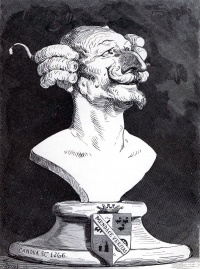Bias
From The Art and Popular Culture Encyclopedia

|
Related e |
|
Featured: |
Bias is an inclination of temperaments or outlook to present or hold a partial perspective at the expense of (possibly equally valid) alternatives in reference to objects, people, or groups. Anything biased generally is one-sided and therefore lacks a neutral point of view. Bias can come in many forms and is often considered to be synonymous with prejudice or bigotry.
Contents |
In judgement and decision making
A cognitive bias is the human tendency to make systematic decisions in certain circumstances based on cognitive factors rather than evidence. Bias arises from various processes that are sometimes difficult to distinguish. These processes include information-processing shortcuts, motivational factors, and social influence (Wilcox, 2011). Such biases can result from information-processing shortcuts called heuristics. They include errors in judgment, social attribution, and memory. Cognitive biases are a common outcome of human thought, and often drastically skew the reliability of anecdotal and legal evidence. It is a phenomenon studied in cognitive science and social psychology.
In the media
Media bias is the bias of journalists and news producers within the mass media, in the selection of which events and stories are reported and how they are covered. The term "media bias" implies a pervasive or widespread bias contravening the standards of journalism, rather than the perspective of an individual journalist or article. The direction and degree of media bias in various countries is widely disputed.
Practical limitations to media neutrality include the inability of journalists to report all available stories and facts, and the requirement that selected facts be linked into a coherent narrative (Newton 1989). Since it is impossible to report everything, selectivity is inevitable. Government influence, including overt and covert censorship, biases the media in some countries. Market forces that result in a biased presentation include the ownership of the news source, concentration of media ownership, the selection of staff, the preferences of an intended audience, and pressure from advertisers.
Political bias has been a feature of the mass media since its birth with the invention of the printing press. The expense of early printing equipment restricted media production to a limited number of people. Historians have found that publishers often served the interests of powerful social groups.
Other aspects
- Economic: When People/Government interpret a law/contract in their favor for economic reasons.
- Inductive bias in machine learning.
- Cultural bias: interpreting and judging phenomena in terms particular to one's own culture.
- Racism, regionalism and tribalism: Judging people or phenomena associated with people based on the race/ethnicity, region of origin, or tribe of the people, rather than based on more objective criteria.
- Sexism: Judging based on gender, rather than on more objective criteria.
- Heteronormativity: The belief that every person is innately heterosexual. Other sexual orientations are not immutable characteristics of people, but simply consist of sexual practices that are believed to be deviant.
- Homophobia: The belief that homosexuality is inferior to heterosexuality.
- Sensationalist: put simply, favouring the exceptional over the ordinary. However this sentence structure makes is sound like an appeal to popularity or normalcy fallacy. This is actually a more complex problem, whereby, the proponent elevates the importance of the evidence to more subjects than it is relevant. This is accomplished by willfull bias, assumption or, putting conclusion ahead of evidence. In practice, this includes emphasizing, distorting, or fabricating exceptional news stories to boost popularity.
- Funding bias in scientific studies also known as the agent-principle dilemma.
- Medical bias is also known as a physician having a conflict of interest.
- Biasing or bias in electrical engineering: force applied as a reference level in order to operate a device.
See also
- Prejudice
- Impartiality
- List of cognitive biases
- Scholarly method
- Source criticism
- Weasel word
- Detection theory
- Experimenter's bias
- Social desirability bias
- Political correctness

